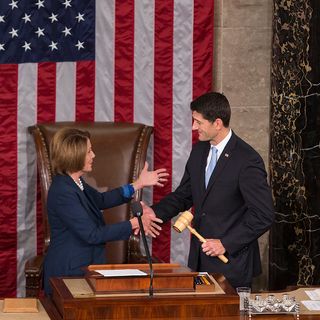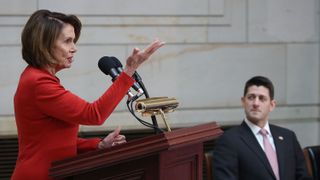This year’s midterm elections will aggravate America’s partisan warfare and polarisation. The Democratic Party is currently narrowly favoured to retake the House of Representatives on 6 November. With that, a new cohort of Democrats would come to Congress in 2019, powered by the hard-line anti-Trump views of their base, motivated to derail Trump’s legislative agenda and presidency.
A Democratic House majority would face considerable pressure from their base to immediately vote to impeach President Trump.
A Democratic House majority would face considerable pressure from their base to immediately vote to impeach President Trump. Impeachment does not equal removal from office – a trial and guilty vote from a super-majority of two-thirds of the Senate is required for the latter, which remains highly unlikely because almost 20 Republican senators would have to vote to end the Trump presidency. Nonetheless, impeachment proceedings would set a tone of full-throated Democratic opposition to the president, create constant media distraction, and likely accentuate Trump’s erratic decision-making style.
Despite the Republican Party’s razor thin majority in the US Senate – 51 seats to 49 – the GOP is expected to retain the upper chamber. Senators up for re-election this year hold seats won in 2012, in an election cycle that comfortably re-elected Barack Obama and elevated several new Democratic senators in competitive and traditionally Republican states. This year’s highly uneven Senate map favours Republicans, who are defending just nine mostly safe seats and targeting 26 Democrats, 10 of whom represent states won by President Trump in 2016. In the event that Republicans hold the Senate and the House, they will continue to pursue core policy priorities, but remain internally divided between establishment and nationalist wings.
Campaign season will exacerbate America’s splintered politics. The Democrats are moving to the left, adopting many of the progressive priorities that helped Bernie Sanders win 43 per cent of votes in the 2016 primary against Clinton. Some progressive Democrats will launch primary challenges against incumbents in the coming months who, if elected to Congress, will continue to pull the party leftwards on other issues including the minimum wage, reproductive rights and military spending.
The Republican Party is being remade in President Trump’s image. Since the 2016 election, few congressional Republicans have been prepared to enunciate the benefits of multilateral free trade or immigration.
Meanwhile, the Republican Party is being remade in President Trump’s image. Since the 2016 election, few congressional Republicans have been prepared to enunciate the benefits of multilateral free trade or immigration. Whereas Republicans were vocal in their criticism of the ballooning national debt under Obama, the Republican majority in the 115th Congress has voted for multiple bills that would push up the debt by over a trillion dollars.
House leaders Paul Ryan and Nancy Pelosi already face a difficult task achieving compromises acceptable to their caucuses. As recent special elections in Alabama and Pennsylvania have illustrated, Republican and Democratic candidates are willing to run not just against the opposing candidate, but also against their own party leadership.
Consequently, Congress has limited capacity to reach bipartisan consensus and execute its most basic functions. It has not passed a defence budget on time since 2009, under presidents and congresses of varying partisan compositions. The US military has been operating on a series of Continuing Resolutions that give senior leaders no certainty over funding, leaving them hamstrung in their ability to make long-term strategic decisions. And there is little indication that Congress has the political will to re-enter the Trans-Pacific Partnership, leaving the Trump administration’s ‘Free and Open Indo-Pacific’ concept without an economic plank.
The midterms will all but guarantee that Washington remains dysfunctional and distracted through the remainder of Trump’s first term.
Australia and the 2018 US midterm elections: A primer








